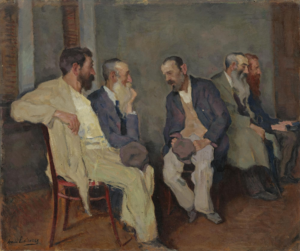The Art of Conversation
I met Joshua back in the Fall of 2019 at one of the exits off Interstate 40 that cuts through the middle of downtown Nashville. Joshua is a newspaper vendor who sells The Contributor, a street newspaper focusing primarily on social justice issues involving poverty and homelessness. At peak morning hours (pre-Covid-19), there can be a steady stream of cars driving onto the exit ramp. These vehicles approach a traffic light where Joshua operates his business on this prime real estate. Then drivers must choose one of three different directions to take, and so become absorbed into the vast web of city streets. Drivers caught by the red light are usually so taken up by the self-absorbed process of destination driving to notice anything other than the irritating slowness for the light to change to green.

Those early meetings with Joshua were what I call the “baton hand-offs.” It was the type of transaction that offers minimum reward: Joshua and I trade a couple of bucks and some snacks for a copy of The Contributor; we also swap a cheerful greeting, an exchange of “thank you/you’re welcome”–those obligatory marks of good manners, and, if the light is red, then time for a casual comment on the weather or an inquiry into the other’s well being…platitudes in place of real conversation. When the light changes to green, I’m off to my appointment, and Joshua goes back to his place at the top of the intersection to repeat his march down a fresh line of cars.
To see Joshua was not an everyday occurrence. I don’t regularly drive into Nashville, and when I do, my destination does not always take me to his exit. But in the last several months I have had the good fortune to grab hurried seconds with Joshua. Here is what I have observed in our numerous one-on-one’s: Joshua is reliable; always at his post unless inclement weather prevails. He has a business-like deportment that includes a smile. While his attire may not be the latest fashion, his wardrobe is clean and neat. Only once have I seen him on the phone when I pulled up, but he was conversing with his worried mother arranging for her son to get a protective mask against Covid-19. Otherwise, he is paying attention to potential customers, holding an opened copy of the paper in one hand, while offering a friendly wave with the other. The rest of the papers are neatly folded and placed inside the pouch hung over his neck with its cover of clear plastic revealing the headlines and a sticker with the price of the paper below it. On a separate laminate is a picture I.D., also draped around his neck. He is a professional.

Over time, our conversations, while brief, have deepened and become more meaningful. We’ve met so many times now that he recognizes my car even when I am way back in the pack. I am greeted with the “Usain Bolt has-left-the-building” pose and a bright smile. He will head straight for me ignoring the other drivers as he briskly walks in my direction. After fist-bumps and the standard business exchange, Joshua offers updates on his life: a need to be closer to work, so he temporarily moved in with his aunt until affordable housing could be found; he walks or rides the bus to Downtown Presbyterian Church where the paper is published to purchase his papers, and then on to his work location (the earlier the better); and the economic effects of Covid-19 have meant fewer cars are taking his exit because fewer drivers are coming into town to work, thus fewer papers sold. He never complains. He is grateful to be making a living and achieving a measure of self-reliance. And then there is a confessional moment when he told me he gave the Girl Scout cookies I recently gave him to his aunt because he doesn’t care for them. Loved his honesty.
I shared with him my background in selling newspapers back in the day, and we commiserated on the newspaper vendor’s vulnerability to unpredictable weather, one among many other dangers. In my confessional moment I told Joshua of the tough times my two daughters and their families have experienced in this time of pandemic. Underlying each of these snippets of conversation is a sense of urgency for we know the light will soon turn green and we must part. So what we share has a traction of depth.
On the surface, these conversations may not have the qualities of what we expect from long-term friendships. But the words spoken are the forays into a deepening relationship. It is the frequency of encounters that matters. It is the generosity of spirit that counts. It is the respect and dignity we offer each other by pausing in our day to look each other in the eye and speak kind words and even blessing.
The world right now is topsy-turvy. If the forces of Mother Nature and Covid-19 weren’t bad enough, or high unemployment, there is a malignant disease let loose in the land, odorless, colorless, tasteless. It is the sound and fury of cruel language and savage behavior. We need only observe the revilement between many of our political leaders…all stripes; between many of our religious leaders…all stripes; between many of our social leaders…all stripes, down to the common man and woman on the street to see that the bully pulpits do not lack for bullies. However ornate or simple in design, pulpits are pieces of furniture that do not encourage conversation.

In the famous “Sermon on the Mount,” Jesus had a term for folks that loved to stand in the streets playing to the crowds and drawing attention with public shows of false piety. (When the mask of false piety breaks open it often leads to rage.) He calls them “hypocrites,” which is the Greek word for play-actor. (Ouch, that hurt) He goes on to say that these “play-actors” love to babble on about their beliefs because they think God is sitting in a box seat applauding this theatrical performance. And if not for God, then for an audience of like-minded people.
The voices and faces of rage too often carry the day, and the selection of rage-inducing topics is vast. Rage is a destroyer. Among many things it destroys is conversation, and once conversation is destroyed, the aftermath can be brutal. The art of conversation includes the powerful component of listening. One cannot be yelling and listening at the same time. Language delivered at such heated levels becomes high decibel gobbledygook. All you are left with is a contorted visual of rage on the human face: swollen visage, popping neck veins, mouths agape, and bulging eyeballs. It is the same physical effect as strangulation only self-induced.

When I was age twenty there was a lot of raging going on in this country: Vietnam, Civil Rights, street riots, burning buildings, mass demonstrations on college campuses with multiple killings—remember Kent State (white kids murdered)? Remember Jackson State (black kids murdered)? Those were the daily headlines back then. There was a “famine in the land” for a true word. I am only days away from my seventieth birthday, and I can say with King Solomon, there is nothing new under the sun. We still rage. We are still brutal. Just witness the recent murder of Ahmaud Arbery, one in a ad infinitum line of senseless murders of young black men. Our souls are wasting away because our conversations lack true words.
We are complex human beings. The fabric of our souls is thin and woven together with delicate threads. The space between us can be measured in widths of hair follicles. Joshua and I could not be further apart in so many ways, but each time we meet and with each conversation, a layer of human connection is added and we take a step closer to losing ourselves for the sake of each other. There is a spiritual component at play here. It is more than just reaching across the divide. It is a giving up or losing of oneself. Self-help is not the way. It is self-sacrifice. Jesus said if you want to find yourself, you have to lose yourself. It is a divine paradox that defies all manner of personal vanities, defies all the raging for those self-important rights and privileges. What are we willing to trade for our souls?

We are capable of civility. It begins with conversations that are equal parts listening and speaking, equal parts conviction and empathy, and equal parts understanding and forgiveness. We all desire it. We must first be willing to offer it.
Cover Art: Attributed to Belgian painter, Rene Magritte

